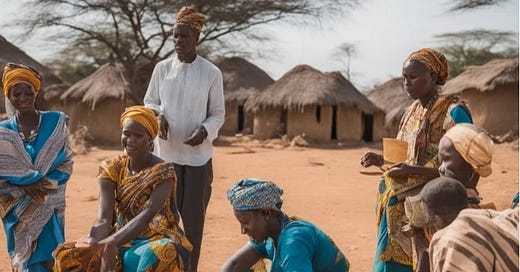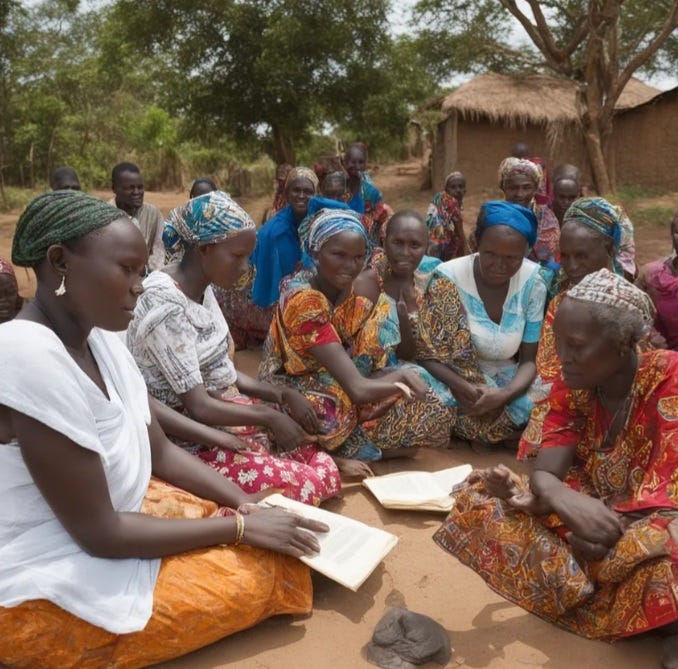There is so much trouble in our world, I wonder how many of us truly feel that we do not walk alone. I am touched by the idea that communities in a distant land have created what we all so deeply want … connection, community, security in times of trouble and need.
Thank you Edwin Kiptoo Ngetich, for offering us this inspiring guest post that gives us a glimpse of who we might grow into. I am haunted by your words: “You only need to care.”
Guest post by Edwin Kiptoo Ngetich, The Start-Up From Africa
"Kinyozi hajinyoi.”
These are two mere words in Swahili language, but they hold a significant place among the African people and how they grow themselves. The phrase literally translates into no barbers shave themselves, but it symbolizes our deeply-held conviction of our being a group, both emotionally and economically.
We felt their presence. They calmed our sorrowful hearts.
When my father returned to the cosmos last year, neighbours thronged our compound in large numbers to offer their emotional and financial support. We felt their presence. They calmed our sorrowful hearts. Amid our struggle to come to terms with the demise of my father, my family and I found a hand to hold, an ear to listen, and a heart to understand through harambee. We drank tea and shared serious and fun moments with our neighbours, friends, relatives, strangers, and co-workers.
So, here is the deal, just know while in Africa, especially Kenya, be assured that when trouble visits you, you will not walk alone. Harambee is an unwritten will of generosity among Kenyans and you don't need to be rich or intelligent to extend your hand of support. You only need to care.
While harambee has been ingrained and embraced as a way of growing in an African set up, its origin can be traced back to the 19th century when Indians arrived in East Africa to build the present, near-defunct Kenya-Uganda Railway. The word’s historical emergence is diverse, with others claiming that some porters used it as a rallying call for lifting heavy objects from ground. In India, the word "hare" symbolizes resourcefulness, agility, as well as swiftness. “Amber,” on the other hand, is synonymous with Durga, a powerful goddess and fierce warrior deity embraced in devotional songs. Porters would shout "hare" when carrying heavy loads of items while the other group would respond with "ambe" to psych up.
Hara.....mbee!
Since then, harambee has been owned by Kenyans and embedded into the government's coat of arms. But, it is households with low-income in rural areas that have made it their way of living and team up together to attain a common goal of uplifting each other. They have engineered a growth-hack strategy that has seen them mount cumulative efforts to pass through the storms of life. When a child is being admitted into the university, harambee is organised. When unexpected funeral or hospital expenses arise, villagers would extend their harambee hand.
From fund raising to emotional support, harambee has been transitioned and embodied as a way of life not only in local, remote villages but also in small towns. Whenever a community member is in dire need of assistance, his or her family members will communicate with the head of a village committee or an elder who will then call up a meeting with other community members to discuss the issue at hand. They will, thereafter, decide on the date to fundraise and tender their emotional support. It has since spread to other small, growing towns. Contrained by economic turmoils, urbanites have as well found financial solace in harambee.
We believe no one grows or wades through problems alone. I am a product of it. My family is a product of it. I am proud of its tremendous progress of fostering development and civilization and cushioning people from the inevitable troubles of this world.
Long live harambee!
Discussion: Could we be a community? Could we practice harambee?
In a culture (USA) that mythologizes self-made heroes (as if there were such a thing), that turns to guns and gates and walls for security, that prioritizes productivity over connection, profit over compassion, how could we begin to practice more harambee?
Would love to hear your thoughts. Thanks again, Edwin. See more of his work at
Postscript: (bigger than a PS)
This may turn into a never-ending story. As I finish the logistical details of transforming Edwin’s email into a Substack post, a vibration begins, first in my forearms and then traveling up through my chest. A new idea passing cell to cell, gathering momentum, turning into what I’m not sure.
This all began when Edwin responded to a comment I made in Notes about being receptive to guest posts. I didn’t know him and didn’t even bother to look at his Substack. His name looked foreign, possibly African. I had no expectations when I responded “sure.” (There is an undertone in these reactions that bothers me and I know they need further exploration.)
Some time later I was surprised to see a submission show up in email. It didn’t seem like a fit but there was a kernel of something that intrigued me. I responded somewhat negatively but as kindly as possible, suggesting a different direction. I did not expect a response.
However, a response came with pieces of the original but completely reoriented toward something that now grabbed me. A couple of tweaks and some images and the above guest post was ready.
The point of this is that I started out with my generosity glasses on thinking I was doing someone else a favor, and then it turned into a gift, perhaps a transformational gift, to me.
I have spent most of my adult life looking for connection and community (qualities missing in my childhood), symbolized by the way-more-than-average number of moves I’ve made. A little over a year ago, I moved into a retirement community (basically an apartment complex of over 62-folks) … and became a hermit, avoiding almost all aspects of community.
There were reasons, none of them all that interesting. Enter Substack … not just writing, … Substack. I blogged for 14 years, all about anything I wanted to write about … childhood, fears, travels, likes and dislikes, spiritual searchings … everything. For me, blogging was personal with no discipline required and no one in mind other than myself.
I came to Substack to write about gratitude with a rather commercial mindset about its possibilities. Stirrings of connection and community quickly caught my attention. My background of business and entrepreneurism (as well as the commercial possibilities) pulled me into writing about building a newsletter. That took me deeper into thinking and writing about community.
All the while maintaining my distance from the community I’m living in.
This morning, as I re-read and made tiny edits to Edwin’s post, then posted and re-edited again multiple times, the message sank to a different level and those words: You only need to care took on a different tone, a personal, challenging tone of What am I going to do?
As I went down to breakfast on this sunny morning, I met a man with a walker coming out of the elevator. He smiled. I smiled. And, we began a conversation. He is new here, in this place where people come and go a little faster than perhaps a multi-generational apartment complex. His name is Selwyn and he has been here four days and he’s a “doodle artist.” I’m not even sure what that is, but I feel him reaching out, yearning for connection. We chat a bit more and then go on our way.
I don’t know what to do about what I feel about all of this … except inept; I haven’t learned how to live harambee. But, I can feel this vibration calling me, and I am going to think deeper about Edwin’s words: you only need to care.
More to come, I’m sure.







I really enjoyed this. First Edwin's explanation of how rural Kenyan's build and benefit from harambee, and then your own realisation that he was offering you more than a guest post. A really lovely piece, Joyce. Thank you for sharing.
The phrase literally translates into no barbers shave themselves, but it symbolizes our deeply-held conviction of our being a group, both emotionally and economically.
I love "no barbers shave themselves" as a comment on the individualism culture ingrained in the United States. It was a part of the pioneer can-do spirit, and it holds us back from seeing all of us as one in the US, probably now more than ever.